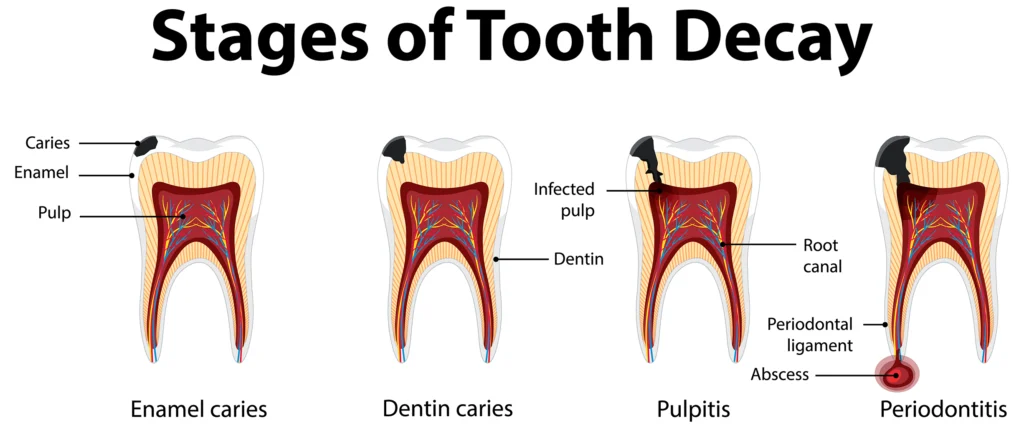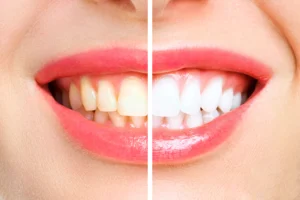Table of Contents
Dental health plays an essential role in our overall well-being, and part of maintaining that health is understanding the problems that can affect our teeth. Cavities and tooth decay are two of the most common dental issues people face. However, many don’t know the difference between them, how they can be prevented, and what steps to take when they occur. In this article, we will explore the distinction between cavities and tooth decay, how you can prevent these problems, and what to do if they happen. At Rim Point Dental, we are committed to helping you maintain optimal oral health through education, prevention, and expert care.

What Are Cavities and Tooth Decay?
Cavities and tooth decay are closely related, but they are not the same thing. Let’s break down what each term means:
Tooth Decay
Tooth decay is the gradual destruction of the tooth’s enamel—the hard, outer surface of your teeth—caused by acids that are produced when bacteria in your mouth break down sugars. This process can lead to small holes or pits in your teeth, which, if left untreated, develop into cavities. Essentially, tooth decay is the process, while a cavity is the result of that process.
Cavities
A cavity is the physical hole or damaged area in a tooth that forms as a result of untreated tooth decay. Cavities can occur on the surface of the tooth or in between teeth and can eventually reach the deeper layers of the tooth if not treated. As the cavity worsens, it can cause pain, infections, and even tooth loss.
Are cavities painful?
Cavities may not always cause pain in their early stages, but as they grow and affect the deeper layers of the tooth, they can cause discomfort and sensitivity, especially when eating or drinking something hot, cold, or sweet. If a cavity reaches the nerve of the tooth, it can lead to severe toothache and even infection.
The Stages of Tooth Decay
To understand how to prevent and treat cavities and tooth decay, it’s essential to know the different stages of decay:
- Demineralization: This is the earliest stage of tooth decay, where the enamel begins to lose essential minerals due to acid exposure. You may notice white spots on the tooth, indicating weakening enamel.
- Enamel Decay: If the demineralization process continues, it will break down the enamel, leading to the formation of a small cavity.
- Dentin Decay: Once the enamel is worn through, decay can reach the dentin, the softer tissue beneath the enamel. At this stage, the cavity grows, and you may start to experience discomfort or sensitivity.
- Pulp Damage: If left untreated, decay can progress further into the pulp of the tooth, where the nerves and blood vessels are located. This can result in severe pain and infection, possibly requiring a root canal or tooth extraction.
- Abscess Formation: In the final stage of untreated tooth decay, an abscess (a pus-filled infection) may form at the base of the tooth. This is a serious condition that can cause intense pain, swelling, and even spread the infection to other parts of the body.
How to Prevent Cavities and Tooth Decay
Prevention is the most effective way to avoid cavities and tooth decay. Here are some simple yet powerful steps to keep your teeth healthy and decay-free:
Maintain a Consistent Oral Hygiene Routine
Proper oral hygiene is your first line of defense against tooth decay. Make sure to:
- Brush twice a day: Use fluoride toothpaste and a soft-bristled toothbrush to clean your teeth for at least two minutes, morning and night.
- Floss daily: Flossing removes food particles and plaque from between your teeth that your toothbrush can’t reach.
- Use mouthwash: An antibacterial mouthwash can help reduce plaque and prevent the buildup of harmful bacteria that lead to tooth decay.
Limit Sugary Foods and Drinks
Sugars feed the bacteria in your mouth, which produce acids that erode your enamel. Limiting your intake of sugary snacks, candies, and sodas can reduce the risk of cavities. If you do indulge, try to brush your teeth or rinse your mouth with water afterward to minimize damage.
Stay Hydrated
Drinking plenty of water helps wash away food particles and bacteria. Water also promotes healthy saliva production, which neutralizes acids and aids in protecting your teeth from decay.
Eat a Balanced Diet
Eating foods rich in vitamins and minerals, especially calcium, phosphates, and vitamin D, can strengthen your enamel and support overall oral health. Incorporate leafy greens, dairy products, and nuts into your diet to keep your teeth strong.
Visit Rim Point Dental Regularly
Regular dental checkups are crucial for preventing cavities and tooth decay. At Rim Point Dental, we recommend biannual visits for cleanings and examinations. Our dental team can catch early signs of tooth decay and address them before they become more serious problems.
Consider Dental Sealants
Dental sealants are a protective coating applied to the chewing surfaces of your molars and premolars, which are the areas most susceptible to decay. Sealants act as a barrier against plaque and food particles and can help prevent cavities, especially in children.
Use Fluoride
Fluoride is a natural mineral that helps rebuild weakened enamel and can even reverse early stages of tooth decay. Most toothpaste contains fluoride, but your dentist may recommend additional fluoride treatments during your checkups.
What to Do If You Have Cavities or Tooth Decay
If you suspect you have a cavity or tooth decay, it’s important to act quickly to prevent further damage. Here’s what you should do:
Visit Our Dentist
If you’re wondering how to get rid of tooth decay, the first and most crucial step is to visit your dentist. Only a professional can accurately diagnose cavities and tooth decay and recommend the best course of action. At Rim Point Dental, we offer comprehensive dental exams to identify cavities early and provide the necessary treatment to restore your oral health.
Treatment Options for Cavities and Tooth Decay
Depending on the severity of the decay, your dentist may recommend different treatment options:
- Fluoride Treatment: If tooth decay is caught early (before a cavity forms), fluoride treatments can help restore enamel and reverse the decay.
- Dental Fillings: For cavities that have already formed, a filling is the most common treatment. The dentist will remove the decayed part of the tooth and fill it with a material such as composite resin, amalgam, or porcelain.
- Root Canal: If the decay has reached the pulp of the tooth, a root canal may be necessary to remove the infected tissue and save the tooth. After the procedure, a crown is often placed over the tooth for protection.
- Tooth Extraction: In severe cases where the tooth is beyond repair, our dentist may need to extract the tooth. If a tooth is removed, you may consider dental implants or bridges to replace the missing tooth.
Pain Management for Cavities
Are cavities painful?
Yes, they can be, especially if left untreated. Cavities often cause sensitivity to hot and cold foods, discomfort when chewing, or sharp pain. If you’re experiencing pain from a cavity, over-the-counter pain relievers can provide temporary relief. However, visiting our dentist for treatment is essential to address the root cause of the pain and prevent it from worsening.
Final Thoughts
Cavities and tooth decay are common dental issues, but they can be prevented with proper care and attention. By maintaining good dental hygiene habits, making smart dietary choices, and visiting Rim Point Dental regularly for checkups, you can protect your teeth from decay and avoid the pain and complications that come with cavities.
If you think you might have a cavity or are worried about tooth decay, don’t wait to seek professional help. The team at Rim Point Dental is here to guide you through preventive care, treatment options, and ongoing dental health support to ensure you keep smiling confidently for years to come.
Your oral health matters—schedule your appointment today with Rim Point Dental and take the first step toward a healthier, brighter smile!



